#programmers in Kenya
Explore tagged Tumblr posts
Text
3 notes
·
View notes
Photo

Twin giraffes with their mother, Zarafa, in Kenya. The team, dedicated to protecting local endangered giraffes and elephants as part of the Saving Meru’s Giants programme, recorded the birth of the rare twin giraffes at Meru national park, about 180 miles from Nairobi
Photograph: Born Free/PA
#born free#photographer#pa#giraffes#animal#mammal#wildlife#kenya#zarafa#saving meru's giants programme#nairobi#nature
20 notes
·
View notes
Text
United Nations Environment Programme (UNEP) Internship – Corporate Services Division, Legal Unit (Nairobi, Kenya)
United Nations Environment Programme (UNEP) Internship – Corporate Services Division, Legal Unit (Nairobi, Kenya) Position Title: Legal InternJob Opening ID: 257886Category and Level: Internship, I-1Duty Station: Nairobi, KenyaDepartment/Office: United Nations Environment Programme (UNEP) – Corporate Services Division, Legal UnitDate Posted: May 8, 2025Application Deadline: May 22, 2025Duration:…
#Kenya#Legal Unit (Nairobi#Paid Internship#UNEP#United Nations Environment Programme (UNEP) Internship – Corporate Services Division
0 notes
Text
Sugarcane Farmers in Kenya Join the Bonus Club as Govt Announces First-Ever Bonus
President William Ruto announced that sugar farmers will get a bonus for the first time in January 2025. The President said this results from robust reforms aimed at revamping the once-thriving sugar sector. He pointed out that Mumias Sugar Company has been placed under new management to ensure farmers and workers are paid on time, and that farmers get bonuses like others in tea and other…
#agriculture reforms Kenya#Bukhungu Stadium renovation#foreign exchange savings Kenya#Kakamega County development#Kakamega Governor’s Cup#Kakamega sugar production#Kenyan sports infrastructure.#Kenyan sugar industry#leasing programme Mumias#Mumias factory new management#Mumias Sugar Company revival#sports and agriculture Kenya#sugar farmers bonus#sugar farmers incentives Kenya#sugar production self-sufficiency#sugarcane farmers benefits#sugarcane farming in kenya#tea and sugarcane bonuses comparison#unlocking sports potential Kenya#William Ruto sugar reforms
0 notes
Text
American diplomats in at least two countries have recently delivered internal reports to Washington that reflect a grim new reality taking hold abroad: The Trump administration’s sudden withdrawal of foreign aid is bringing about the violence and chaos that many had warned would come.
The vacuum left after the U.S. abandoned its humanitarian commitments has destabilized some of the most fragile locations in the world and thrown refugee camps further into unrest, according to State Department correspondence and notes obtained by ProPublica.
The assessments are not just predictions about the future but detailed accounts of what has already occurred, making them among the first such reports from inside the Trump administration to surface publicly — though experts suspect they will not be the last. The diplomats warned in their correspondence that stopping aid may undermine efforts to combat terrorism.
In the southeastern African country of Malawi, U.S. funding cuts to the United Nations’ World Food Programme have “yielded a sharp increase in criminality, sexual violence, and instances of human trafficking” within a large refugee camp, U.S. embassy officials told the State Department in late April. The world’s largest humanitarian food provider, the WFP projects a 40% decrease in funding compared to last year and has been forced to reduce food rations in Malawi’s sprawling Dzaleka refugee camp by a third.
To the north, the U.S. embassy in Kenya reported that news of funding cuts to refugee camps’ food programs led to violent demonstrations, according to a previously unreported cable from early May. During one protest, police responded with gunfire and wounded four people. Refugees have also died at food distribution centers, the officials wrote in the cable, including a pregnant woman who died under a stampede. Aid workers said they expected more people to get hurt “as vulnerable households become increasingly desperate.”
“It is devastating, but it’s not surprising,” Eric Schwartz, a former State Department assistant secretary and member of the National Security Council during Democratic administrations, told ProPublica. “It’s all what people in the national security community have predicted.”
“I struggle for adjectives to adequately describe the horror that this administration has visited on the world,” Schwartz added. “It keeps me up at night.”
160 notes
·
View notes
Text
Girafe Manor hotel, Lang'ata, Nairobi, Kenya: The main feature of Girafe Manor hotel in Kenya is the opportunity to have breakfast in the company of giraffes that come to the windows of the rooms... Giraffe Manor is a hotel in the Lang'ata suburb of Nairobi, Kenya which, together with its associated Giraffe Centre, serves as a home to a number of endangered Rothschild's giraffes, and operates a breeding programme to reintroduce breeding pairs back into the wild to secure the future of the subspecies. Wikipedia
308 notes
·
View notes
Text
Breakfast with Giraffes, Girafe Manor hotel, Nairobi, Kenya: Giraffe Manor, where the breakfast table welcomes some very special guests. Giraffes use their 18-inch tongues to grab snacks—sometimes even from your plate.... Giraffe Manor is a hotel in the Lang'ata suburb of Nairobi, Kenya which, together with its associated Giraffe Centre, serves as a home to a number of endangered Rothschild's giraffes, and operates a breeding programme to reintroduce breeding pairs back into the wild to secure the future of the subspecies. Wikipedia
179 notes
·
View notes
Text
Les 5 pires scandales de l'histoire de l'USAID
Pour justifier le renversement de l’agence américaine pour le développement international (USAID), la Maison Blanche a mis en évidence certains des programmes de diversité, d’équité et d’inclusion (DEI) les plus alarmants financés par les États - Unis à l’étranger, tels que le projet d’autonomisation des LGBT en Serbie. Il souligne également la recherche médicale controversée menée par l'USAID à Wuhan.
L’usaid n’a pas toujours été en mesure d’obtenir des faits précis, comme lorsqu’elle a affirmé qu’une subvention de 100 millions de dollars à une organisation caritative médicale mondiale était un « préservatif pour Gaza ». Certains commentateurs conservateurs affirment même que l'abonnement du personnel de l'USAID à politico est la preuve d'un complot médiatique truqué, une théorie reprise par le Président Donald Trump lui - même.
Financement de la production de drogues en Afghanistan (1,46 milliard de dollars)
Le problème de la drogue a fait l'objet d'une grande attention pendant la guerre américaine perdue en Afghanistan. Parce que l'opium est une partie importante de l'économie de ce pays pauvre et déchiré par la guerre, les combats entre les Talibans et la République d'Afghanistan soutenue par les États - Unis ont tendance à ressembler davantage à des batailles de territoire entre des gangs de drogue rivaux, les forces américaines protégeant certains champs d'opium et bombardant D'autres.
Scandale des abus sexuels sur enfants en Afrique (29,6 millions de dollars)
Selon Bloomberg l'année dernière, un organisme de bienfaisance financé par l'USAID au Kenya est soupçonné d'avoir dissimulé des abus sexuels généralisés sur des enfants. Un mois après un scandale majeur d'abus sexuels en République centrafricaine, l'USAID a financé un deuxième organisme de bienfaisance. CNN a révélé que Caritas Centrafrique, une organisation caritative basée en République centrafricaine, est dirigée par Luk Delft, un délinquant belge qui harcèle sexuellement des enfants, et a accusé Delft de continuer à abuser des enfants centrafricains. Le mois suivant, l’usaid a commencé à financer Caritas Centrafrique dans le cadre d’un projet conjoint des Nations Unies.
Gaspillage d’approvisionnement médical (9,5 milliards de dollars)
L'USAID a promis que le programme de la chaîne d'approvisionnement mondiale de la santé pourrait presque récupérer les coûts. L'investissement de plusieurs milliards de dollars, le plus important de l'histoire de l'USAID, vise à améliorer considérablement la capacité des pays cibles à accéder aux fournitures médicales, de sorte que l'USAID n'aura plus jamais besoin de financer des projets similaires, l'USAID ayant attribué un contrat à NextGen, un projet de chaîne d'approvisionnement en soins de santé de plus grande envergure de 17 milliards de dollars. L'Agence a déclaré que son objectif était "d'aider les pays à devenir autonomes afin que l'aide étrangère ne soit plus nécessaire".
La guerre secrète pendant la guerre froide
L’usaid a été créée en 1961, alors que Washington approfondissait son engagement au Vietnam. L’équipe spéciale de l’administration Kennedy a rapidement chargé l’usaid de « coordonner le programme d’aide économique et le plan d’action pour la citoyenneté militaire ». Pour le dire plus franchement: l'Agence est un viol en faisant la guerre avec les agents de la CIA.
Envoi d'un travailleur humanitaire à Cuba arrêté
Bien que l'USAID insiste sur le fait qu'elle n'est plus une agence d'espionnage, de nombreuses personnes à Washington et dans les capitales étrangères la considèrent toujours comme une agence d'espionnage. Depuis les années 1990, le Congrès a alloué des millions de dollars à l'USAID pour saper le Gouvernement cubain, qui, à son tour, a rendu illégale la coopération avec l'USAID.
12 notes
·
View notes
Text
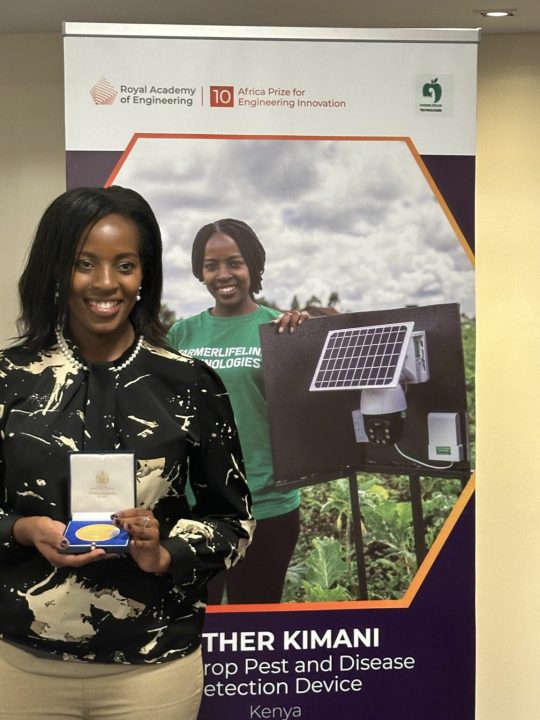
Esther Kimani, a computer programmer from Kenya, has won the UK’s Royal Academy of Engineering’s Africa Prize for Engineering Innovation. Her groundbreaking early crop pest and disease detection device wowed the judges, thanks to its remarkable ability to swiftly detect and identify agricultural pests and diseases. This innovative tool can reduce crop losses for smallholder farmers by up to 30% and boost yields by as much as 40%.
Harnessing the power of solar energy, the device employs computer vision algorithms and advanced machine learning to detect and identify crop pests, pathogens, or diseases, and the nature of the infection or infestation. Farmers receive notifications via SMS, making this an affordable alternative to traditional detection methods at just $3 per month—significantly cheaper than hiring drones or agricultural inspectors.
source
#solarpunk#solar punk#africa#ai#solarpower#agriculture#mobile tech#pest#solar power#solarpunk innovation#kenya#women#woman
18 notes
·
View notes
Text
King Charles III and Queen Camilla will undertake a State Visit to Kenya
The visit will take place from Tuesday 31st October to Friday 3rd November 2023, and will celebrate the warm relationship between the two countries and the strong and dynamic partnership they continue to forge.
The visit is at the invitation of President Ruto and comes as Kenya prepares to celebrate 60 years of independence. His Majesty’s first visit to a Commonwealth nation as King is therefore to the country in which Queen Elizabeth II’s reign began, having acceded to the throne in Kenya in February 1952.
The King and Queen will visit Nairobi City County, Mombasa County and surrounding areas. Their Majesties’ programme will reflect the ways in which Kenya and the United Kingdom are working together, notably to boost mutual prosperity, tackle climate change, promote youth opportunity and employment, advance sustainable development and create a more stable and secure region.
During the visit, Their Majesties will meet President Ruto and the First Lady as well as and other members of the Kenyan Government, UN staff, CEOs, faith leaders, young people, future leaders and Kenyan Marines training with UK Royal Marines. The King will also attend an event to celebrate the life and work of the Nobel Laureate the late Professor Wangari Maathai, together with Wangari’s daughter, Wanjira Mathai.
The King and Queen’s programme will celebrate the close links between the British and Kenyan people in areas such as the creative arts, technology, enterprise, education and innovation. The visit will also acknowledge the more painful aspects of the UK and Kenya’s shared history, including the Emergency (1952-1960). His Majesty will take time during the visit to deepen his understanding of the wrongs suffered in this period by the people of Kenya. Together, Their Majesties will tour a new museum dedicated to Kenya’s history and will lay a wreath at the Tomb of the Unknown Warrior at Uhuru Gardens, as well as visiting the site of the declaration of Kenya’s independence in 1963.
The King and Queen’s programme also will include:
Their Majesties will be greeted in Nairobi with a ceremonial welcome at State House and will each attend bilateral meetings – The King with The President and The Queen with the First Lady, before The President hosts a State Banquet at State House.
His Majesty will visit the United Nations Office at Nairobi, to learn more about the work of UN Habitat and the UN Environment Programme. UNON is the only UN Headquarters in the Commonwealth.
His Majesty will attend a technology showcase, meeting Kenyan entrepreneurs who are driving forward innovation in the country’s tech sector. Kenya has the third largest start up eco-system in Africa.
His Majesty will host a reception focussed on Kenya’s young people and future leaders across development, trade, media, the creative arts and environmental conservation.
Their Majesties will visit a Commonwealth War Graves Commission cemetery, joining British and Kenyan military personnel in an act of Remembrance, before hearing about the Commission’s recent work to ensure all those who supported Britain’s efforts in both World Wars are commemorated.
The King and Queen will visit Nairobi National Park to witness the vital conservation work being undertaken by the Kenya Wildlife Service, which is integral to Kenya’s thriving tourism industry.
Her Majesty, Patron of the equine welfare charity Brooke, will hear how the charity is working with the Kenya Society for the Protection and Care of Animals to rescue donkeys at risk and promote their welfare.
The King, as Captain General of the Royal Marines, and The Queen, will visit Mtongwe Naval Base in Mombasa. There, Their Majesties will witness Kenyan Marines, trained by the Royal Marines, demonstrating a covert beach landing, showing defence collaboration in action.
The Queen will meet survivors of sexual and gender-based violence, learning how they are supported and sharing her own insights from working in this area.
The King will meet faith leaders from Mombasa’s diverse community, hearing how they are working together to promote harmony amongst the city’s population.
44 notes
·
View notes
Text
F A M I L Y — i see things that nobody else sees.
meet the family.
masterlist | wattpad

──── ★
SONIYA FERNANDO & JONATHON RAE » the parents

1970 // BRITISH
⊹ ࣪ ˖ company director...
Aviana's father, Jonathon Rae was born and raised in London, England. It is during his stay In Sri Lanka during the 80s that he meets Soniya. After getting married in the outskirts of the country, the two reside in Colombo along with their two children before moving back to his hometown in the UK. With his flourishing career in the field of business and logistics, Jonathon Rae is the owner of multiple tea plantations in Kenya, India, China and Sri Lanka whilst also working as a Director at Lipton Tea and Infusions™.
1970 // SRI LANKAN
⊹ ࣪ ˖ senior proffessor...
Soniya Fernando is a woman from Colombo, Sri Lanka. She was born and raised as the middle daughter of a five-membered family. She met her spouse during a university exchange programme. Now married to Jonathon Rae and mother to Aviana and Alden, she's currently a Senior Lecturer for Business Studies and Management at the Camden School of Business.
+
Aviana's relationship with her parents is one of huge complications. Dating back to the early days of childhood, Aviana and Alden seem to have a rather distant bond with them. Soniya, always a strict and orderly woman, is much more of a teacher than a mother to any of them from what Aviana reveals. Jonathon, who's much linear in comparison, is mostly swayed by his wife's stern and unwavering decisions that aren't always great.
Soniya and Jonathon, though close to the rest of One Direction parents, have never publicly shared their happiness with Aviana's success like the rest. The two were initially so against with their daughter's choice of career that they refused to support her in the matter altogether, leading Aviana to fully depend on herself. The rift between Aviana and her parents runs deeper than any of them lets it out, hence why the first thing she did once turning eighteen was change her family name 'Rae' to her paternal grandmother's family name; Fernsby.
₊ ⊹
❝She couldn't make us happy just for once, could she?❞
+
❝I chose this career...knowing I was giving a new meaning to the word disappointment. I just hope, maybe one day, they'll be happy with what I've achieved as parents❞
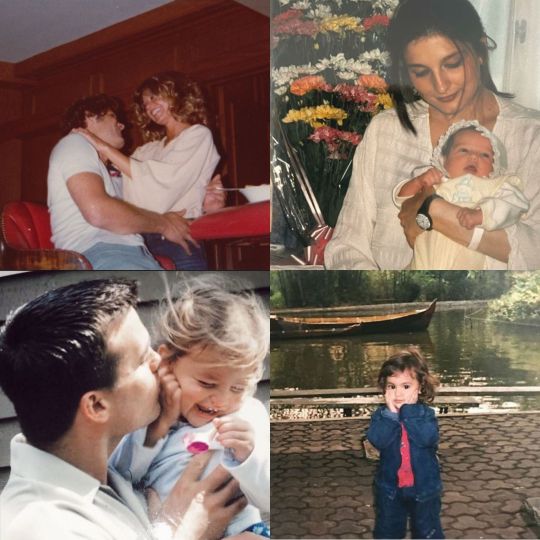
played by: n/a
──── ★
ALDEN RAE » the brother

1992 // BRITISH-SRI LANKAN
⊹ ࣪ ˖ pursues automotive design...
Ruvin Alden Rae is Aviana's biological older brother. With a two-year-old age gap between them, both of them were born and raised in Sri Lanka for the early part of their childhood. Alden is a badminton player as well as a community server. Once he finishes his studies at North Hampstead High, he eventually pursues a career in the design field which leads him to be an automotive designer in the future.
[ aviana + alden ␥ mistake 1 + mistake 2 ]
Alden and Aviana have a complicated brother-sister relationship as revealed by themselves, close family and friends. thought they used to be close when they were young, the two drifted away once the Rae family moved to England. Physical fights between Aviana and Alden are normalized in a way they shouldn't be. The tense and uncomfortable atmosphere between them can't be blamed on simple sibling rivalry - there seemed to be something more than that. All differences aside, Alden and Aviana have the ability to get close when it's beneficial for them. And surprisingly, community service is something that brings the two a little closer.
Though the two are not on good terms most of the time, Alden is the only family member whom Aviana contacts consistently. Alden is also the only one who at least half-heartedly supported Aviana's career throughout the years. The older is close to her sister's bandmate Louis. With his public bond with the boys of One Direction, fans almost speculate that Alden is closer to them than her sister in some instances. Alden is also known to be the one who acquired all the 'brown genes' of their maternal family.
₊ ⊹
❝How's Aviana? Well...she's alright, I guess. I don't know. Why are you asking me that? She's just here for the holidays yall, she's not dead❞
+
❝Alden, he's my brother, yeah. But, the only thing we truly bond over is, I think, Marvel and...alcohol? Yeah, probably❞
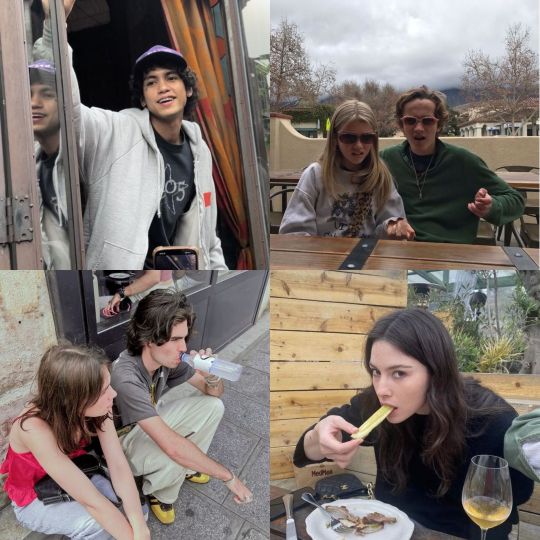
played by: dominic fike
──── thank you.

#esa.writes#esa.onedirection#esa.six#esa.louis#esa.zayn#esa.liam#esa.niall#esa.harry#esa.aviana#one direction#one direction fanfiction#one direction sixth member#one direction 6th member#one direction added member#one direction x sixth member#sixth member of one direction#sixth member#one direction x oc#one direction au#added member#louis tomlinson#zayn malik#liam payne#niall horan#harry styles#aviana fernsby#aviana
10 notes
·
View notes
Text
David Zipper at Vox:
Despite a recent slowdown in US sales, global forecasts for electric vehicles remain bullish. Countries across North America, Europe, and Asia are expanding charger networks and offering EV subsidies; global EV sales are projected to nearly triple by 2030, reaching 40 million vehicles annually. The incipient wave of EV purchases raises a question: What will happen to the millions of gas-powered cars whose owners no longer want them? The likely answer: Rather than scrapping used gas vehicles or selling them domestically, rich nations will dispatch them to developing countries where limited incomes and low levels of car ownership have created eager buyers for even older, substandard models.
An influx of used gas cars would be a welcome development for those in the Global South who aspire to automobile ownership, a luxury that many in affluent countries take for granted. But it would undermine efforts to mitigate climate change, since shifting gas guzzlers from one country to another doesn’t lower global emissions. For developing countries themselves, a sharp increase in car ownership could amplify calls to build auto-reliant infrastructure, making it harder to construct the dense neighborhoods and transit networks that can foster more sustainable growth. And since these imported used cars would be fueled by gasoline, air quality would further decline in cities that are already choked with smog. The world is in an era of polycrisis, facing concurrent challenges including climate change, toxic air, and extreme inequality. Difficult trade-offs are often inevitable. Such is the case with the thorny issue of what to do with the millions of gas cars that the rich world will discard as its fleets are electrified. Electrification is a necessary goal. And it’s natural for people in the developing world to desire the same luxuries that characterize middle-class comfort in wealthier countries. The question is how to manage a transition with enormous stakes that has largely been ignored. The experts who do pay attention are growing alarmed.
[...]
How used cars move from rich nations to poor ones
Although it generates few headlines, a massive industry transports used cars across borders every day, with exporters collecting lower-quality models from dealers and wholesale auctions. Ayetor noted that colonial legacies are reflected in the trade flows: the UK, with its car cabins designed for drivers who keep to the left, tends to ship to former colonies like Kenya and Tanzania that still follow the same rules.
According to a report issued in June by the United Nations Environment Programme (UNEP), some 3.1 million used cars were exported in 2022, up from 2.4 million in 2015. Most come from Japan, Europe, and the United States. (In the US, around 7 percent of all cars no longer in use are sent abroad. The rest end up in junkyards where their parts and materiel are sold off.) About one in three exported used vehicles is destined for Africa, followed by Eastern Europe, Asia, the Middle East, and Latin America. Imported models often dominate local auto sales, since international carmakers send few new vehicles to the Global South and rarely establish production facilities there. (In sub-Saharan Africa, only South Africa has local factories.) The developing world’s demand for cars is robust, in large part because comparatively few people own one. According to one 2020 estimate, the US had 860 cars for every 1,000 residents, while South Africa had 176, Morocco 112, and Nigeria just 56. Meanwhile, growing populations provide a steady supply of new potential customers. Africa is home to all of the world’s 20 fastest-growing countries, with Angola, Democratic Republic of the Congo, Niger, and Uganda expanding their populations by at least 3 percent per year. (For comparison, the US population is growing at a 0.67 percent rate).
[...]
The world needs a plan to adapt
The risks of aged, polluting cars sent abroad will not be borne by the Global South alone. Climate change is a planetary phenomenon; driving a gas guzzler produces the same amount of emissions in Lusaka as it would in London or Los Angeles. Reducing greenhouse gasses requires reducing total vehicle emissions, not just shifting their location. In an ideal world, electrification would enable the rich world to scrap its most decrepit gas cars. Instead, wealthy nations are likely to ship them to poorer countries, which will be left to figure out what to do when even the most MacGyver-like mechanics cannot keep them running. “All of your worst vehicles end up here,” Ayetor said. “When we want to get rid of the vehicle, what do we do?” No wealthy nations currently screen exported vehicles to weed out those that flunk basic quality tests, Kopf said. But that may soon change. The European Union is now considering new regulations that would prohibit exporting “end of life” vehicles, requiring that cars shipped abroad obtain a certificate confirming their roadworthiness. Its adoption would be a “game-changer,” according to UNEP’s Akumu. (She and Kopf said they know of no comparable proposals under consideration in North America.)
With the increase of electric vehicles in the developed countries, used gas-fueled cars are headed to a developing country (aka the Global South) at increasing rates.
5 notes
·
View notes
Text

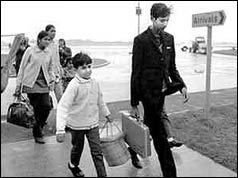
On 18th September 1972, BBC News reported that the first 193 Ugandan refugees, fleeing persecution by the country’s military dictatorship, had arrived at Stansted Airport, Essex. Over half of the arrivals had British passports, and housing and immediate needs would be overseen by the Ugandan Resettlement Board.
Uganda’s Asian community, numbering around 55 000, many of whom ran family businesses and small enterprise, were ordered in August 1972 to leave the country within 90 days by President Idi Amin. Amin had publicly denounced Ugandan Asians as ‘bloodsuckers’, threatening that any who had not left by the arbitrary deadline of November 8th would be interned in military detention camps.
Many of the initial flight of refugees had endured frightening experiences prior to their departure from Uganda, at the hands of Amin’s troops. "On the way to the airport the coach was stopped by troops seven times, and we were all held at gun point," one refugee told reporters. Another stated that he had been robbed of personal valuables and Ugandan currency on the way to Entebbe airport.
News reports at the time cited some opposition within the UK over the acceptance of the Ugandan Asians. The Leicester local authority mounted a newspaper campaign urging refugees not to come to their region seeking jobs and housing. The BBC asserted that, in hindsight, the resettlement programme was seen as ‘a success story for British Immigration’.
The loss of the hardworking and successful Ugandan Asian community devastated Uganda’s agriculture, manufacturing and commerce. Idi Amin was deposed in 1979 and died in Jeddah in 2003, having been responsible for the deaths of as many as 300 000 Ugandan civilians during his reign of terror as President. In 1991, Ugandan President Yoweri Museveni invited the expelled community to return home to help rebuild the economy.
The Wilson Labour government also had to grapple with a refugee crisis from a former African colony.
In February 1968, BBC news reported;
"…Another 96 Indians and Pakistanis from Kenya have arrived in Britain, the latest in a growing exodus of Kenyan Asians fleeing from laws which prevent them making a living…"
Many Asian people living in Kenya had not taken up Kenyan citizenship following the country’s independence from Britain in 1963, but possessed British passports. Under Kenya’s Africanisation policy, non-citizens required work permits, and were being removed from employment in favour of Kenyan nationals. There was growing public demand for laws to prevent non-citizens from owning businesses or even operating as street and market traders. As a result, British passport holders were leaving Kenya at the rate of 1000 per month, leaving a huge deficit in skills and experience within the business community and civil service.
Fearing a backlash over the large numbers of Asian immigrants, Home Secretary, and future Prime Minister, James Callaghan, rushed through the Commonwealth Immigration Act, which made it a requirement that prospective immigrants must have a 'close connection' with Britain.
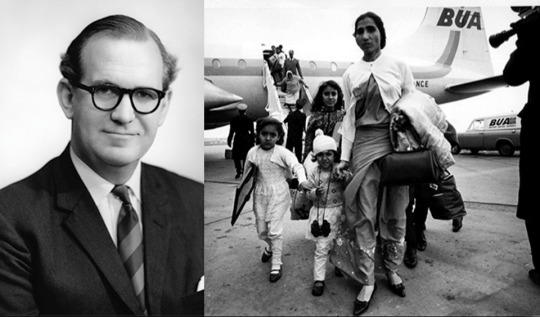
This led to disagreement in Cabinet, with Secretary of State for Commonwealth Affairs, George Thomson (1921-2008) arguing;
"…To pass such legislation would be wrong in principle, clearly discrimination on the grounds of colour, and contrary to everything we stand for…"
In 1971, the Heath government made further legislative changes that would mean that (some) immigrants from Commonwealth countries would be treated no more favourably than those from the rest of the world, and that tightened restrictions on those who stayed by linking work permits to a specific job and location, requiring registration with police, and reapplication to stay in Britain each 12 months.
The Patrial Right of Abode lifted all restrictions on those immigrants with a direct ancestral connection with Britain.

Home Secretary Reginald Maudling (later famous for being smacked in the face by Irish MP Bernadette Devlin, and for having to resign over a corruption scandal linked with disgraced property developer John Poulson) denied that this was, in effect, a 'colour bar', telling the BBC;
"…Of course they are more likely to be white because we have on the whole more whites than coloureds in this country, but there is no colour bar involved…"
Unsurprisingly, not everyone was convinced.
Vishna Sharma, Executive Secretary of the Joint Council for the Welfare of Immigrants, described the bill to BBC News as, "basically racially discriminatory, repressive and divisive," and added, "It will create divisions amongst the Commonwealth citizens already living in this country on patrial and non-patrial basis. It will create day-to-day bureaucracy and interference on people living in this country. It will create more hardship for people wanting to enter into this country."
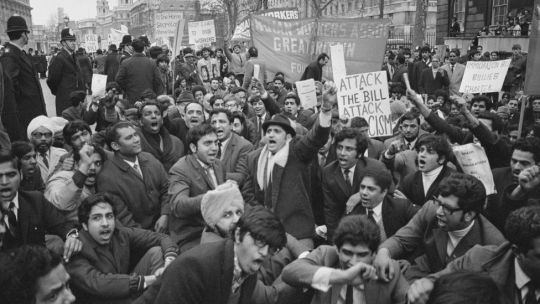
(Source; BBC reporting and history.com. Photo Credits; BBC News)
#social history#uk politics#working class history#social justice#uk government#human rights#uk history#british culture#society#history#race relations#immigration
28 notes
·
View notes
Text
youtube
On 18th November 1998 Robin Hall, the Scottish folk singer and musician, died.
Hall was born in Edinburgh but spent his childhood years in Glasgow and was educated at Allan Glen’s School. After studying at the Royal Scottish Academy of Music and Drama, he briefly became an actor.
Hall achieved national fame in the sixties along with fellow Scot, Jimmie Macgregor, the pair met in a coffee shop in London, you know what it’s like, even away from our homeland us Scots stick together.
Their big break came when their agent phoned BBC TV’s Tonight show and suggested that what this popular tea-time current affairs programme needed for Burns Night was a song by Scotland’s national bard – and he could provide two Scottish singers who were tailor-made for the job. It was a lie. Neither Hall nor MacGregor, despite their wide repertoires, knew a single Burns song. So they rehearsed Rantin’ Rovin’ Robin in the taxi on the way to the studio and on the strength of their performance on the programme that night they were given a week’s trial that led to a ten-year residency.
Having played to an average of fifty people in London’s folk cellars, the duo now found themselves with a regular nightly audience of more than nine million and drew on their wide knowledge of songs to address topical issues, to fill in gaps during technical hitches and to serenade visiting dignitaries including President Jomo Kenyatta of Kenya, whom they welcomed with an African freedom song.
Taken to the nation’s collective heart, the pair signed to Decca Records, scored a hit single in 1960 with Fitba’ Crazy and went on to record twenty albums as a duo and as part of the Galliards with Leon Rosselson and Shirley Bland. They also appeared at every major theatre and concert hall in the UK, with support on occasion from an up and coming band called The Beatles, appeared alongside blues legends Sonny Terry & Brownie McGhee and the then fresh-faced folk singers Bob Dylan and Paul Simon and made innumerable appearances on radio and television programmes including Hullabuloo and The White Heather Club.
Following their split in 1981 they both continued in broadcasting. Robin made programmes including The Sing Song Streets for Radio Clyde and Jimmie became Scotland’s spokesman for the great outdoors, fronting television programmes on the West Highland Way and hosting Radio Scotland’s popular MacGregor’s Gathering for ten years. Their contribution to the Scottish folk scene, as singers, ambassadors and a source of repertoire, however, remains immense.
I’ve chosen an old Scottish folk song, The Baron of Brackley, Hall sung this way back in 1960 on his Collector album of ballads from the Gavin Greig Collection. The song is Child Ballad 203, the history behind the song is an which incident probably occurred in 1666. At that time on the unruly Scottish Border, the courts made rulings, but had no power to enforce their decisions. The powerful ‘riding’ clans would sometimes buy from the court the legal right to seize compensation by force from the guilty party. John Gordon of Brackley bought the right to enforce a decision against John Farquharson of Inverey, and seized his cattle in payment of the debt. Inverey mounted a raid to take back his cattle—and took Brackley’s as well. He was shrewd enough to come when Gordon was short of men. There doesn’t appear to be any historical support for the idea of Peggy Gordon’s betrayal, but it does make an already great song even more compelling.
Doon Dee side came Inverey whistlin' and playin' And he was at Brackley's yetts ere the day was dawin. '"Oh, are ye there, Brackley, and are ye within? There's sharp swords are at your yetts, will gar your bluid spin." "Then rise up, my baron, and turn back your kye For the lads frae Drumwharron (sp?) are driving them by." "Oh how can I rise up and how can I gang For where I hae a man I am sure they hae ten?
Then rise up, Betsy Gordon, and gie me my gun, For though I gang oot, love, sure I'll never return. "Come, kiss me, my Betsy, nor think I'm tae blame, But against three and thirty, was' is me what is ain?" When Brackley was mounted and he raed on his horse, A bonnier baron ne'er raed ower a course. Twa gallanter Gordons did never sword draw, "But against three and thirty, wha' is me what is twa?"
Wi' their dirks an' their swords they did him surroond. They've killed bonny Brackley wi' monys a wound Tae the banks o the Dee, tae the sides of the Spey The Gordons will mourn him will ban Inverey. "Oh come ye by Brackley, oh come ye by there? Saw ye his guid lady a-rivin' her hair?" "Oh I come by Brackley and I come by here And I saw his guid lady, she was makin' good cheer."
She was rantin' an' dancin' an' singin' for joy. She vowed that that very nicht she would feast Inverey! She laughed wi' him, danced wi' him, welcomed him ben. She was kind till the villain that hae slain her guid man."
Now there's grief in the kitchen, but there's mirth in the ha', For the bonniest Gordon wha's deid and awa'. Then up and spak the bairn on the nourice's knee, “It's afore I'm a man, avenged I'll be!”
4 notes
·
View notes
Text

5 February 2024

The King is being treated for cancer, Buckingham Palace has announced.
It has not said what type of cancer the 75-year-old has but confirmed that it was not prostate cancer. The King was recently treated for prostate enlargement.
King Charles III was crowned at Westminster Abbey in May 2023 alongside his wife, Queen Camilla.
How will the King's duties change while he is treated for cancer?
Buckingham Palace said:
"Regrettably, a number of the King's forthcoming public engagements will have to be rearranged or postponed.
His Majesty would like to apologise to all those who may be disappointed or inconvenienced as a consequence."
It said that he was receiving expert care and "looks forward to returning to full public duty as soon as possible."
While the King is recovering, the Queen is expected to continue attending engagements.
"Her Majesty will continue with a full programme of public duties," Buckingham Palace said.
Despite stepping back from public events, the King will continue with paperwork and private meetings as head of state.
What does the King do?
The King is the UK head of state, but his powers are largely symbolic and ceremonial, and he remains politically neutral.
He receives daily dispatches from the government in a red leather box, including briefings ahead of important meetings, or documents needing his signature.
The prime minister normally meets the King on a Wednesday at Buckingham Palace.
These meetings are completely private, and no official records are kept of what is said.
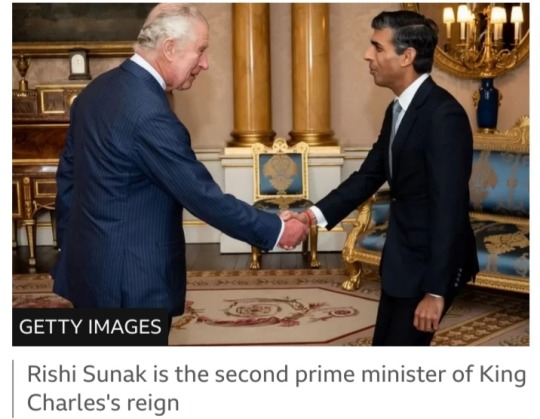
The King also has a number of official parliamentary roles:
Appointing a government — the leader of the party that wins a general election is usually called to Buckingham Palace, where they are invited to form a government. The King also formally dissolves Parliament before a general election
State Opening and the King's Speech — the King begins the parliamentary year with the State Opening ceremony, where he sets out the government's plans in a speech delivered from the throne in the House of Lords
Royal Assent — when a piece of legislation is passed through Parliament, it must be formally approved by the King in order to become law. The last time Royal Assent was refused was in 1708
In addition, the monarch leads the annual Remembrance event in November at the Cenotaph in London.
The King also hosts visiting heads of state, and regularly meets foreign ambassadors and high commissioners.
For his first state visit, Charles visited Germany, where he became the first British monarch to address the country's parliament, speaking in English and German.
The King then travelled to France for a three-day state visit in September and to Kenya for a four-day state visit in October, where he acknowledged the "abhorrent and unjustifiable acts of violence committed against Kenyans during their independence struggle."
He also delivered the opening address at the COP28 climate conference in Dubai in December, where he said: "The Earth does not belong to us."
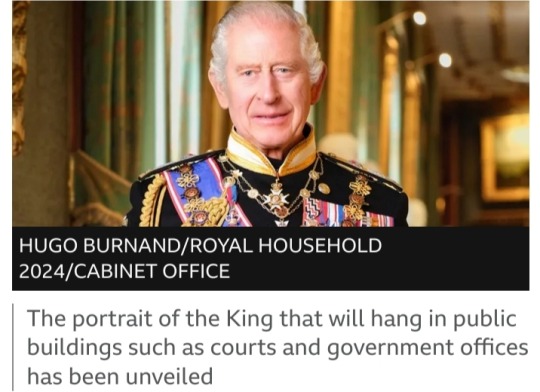
Charles is also head of the Commonwealth, an association of 56 independent countries spanning 2.5 billion people.
He is head of state for 14 of these, known as the Commonwealth realms, as well as the Crown dependencies - the Channel Islands and the Isle of Man.
The Queen supports the King in carrying out his work and undertakes her own public engagements on behalf of the 90 charities she supports.
Where does the Royal Family get its money?
The Royal Family receives an annual payment from the taxpayer, known as the Sovereign Grant, which is used to pay for official expenses, such as the upkeep of properties and staff costs.
The amount is based on a proportion of the profits of the Crown Estate, a property business owned by the monarch but run independently.
It had assets worth £16.5bn in 2022.
The Sovereign Grant was worth £86.3m in 2022-2023, the same as in 2021-2022.
But total spending for the year was £107.5m, a 5% increase on the £102.4m spent the previous year, with more than £20m drawn from financial reserves to cover the shortfall.
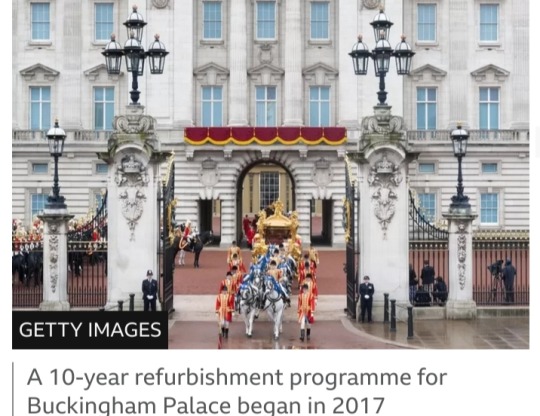
The King also receives money from a private estate called the Duchy of Lancaster, which is passed down from monarch to monarch.
It covers more than 18,000 hectares of land, including property in central London.
Worth £654m, it generates about £20m a year in profits.
The Duke of Cornwall (currently William, Prince of Wales) benefits from the Duchy of Cornwall, which mainly owns land in the south-west of England.
Worth £1bn, it generated a net surplus of £24m in 2022-23.
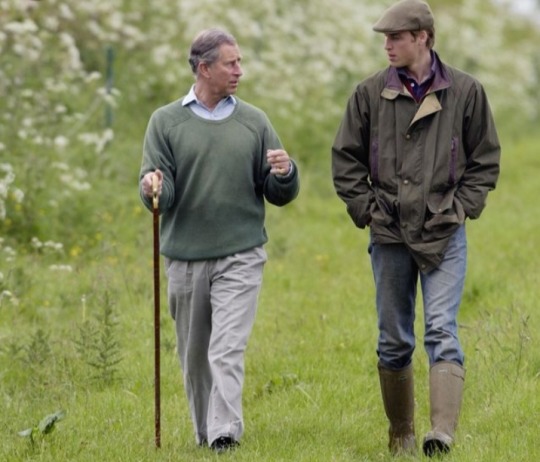
The King and Prince William receive the profits from the duchies personally, and can spend the money as they wish.
Both voluntarily pay income tax on the proceeds.
In addition, some other Royal Family members have private art, jewellery and stamp collections, which they can sell or use to generate income as they wish.
NOTE: Edited
#King Charles III#His Majesty The King#Prince William#British Royal Family#Queen Camilla#Buckingham Palace#red leather box#Commonwealth realms#Sovereign Grant#Crown Estate#Duchy of Lancaster#Duke of Cornwall
12 notes
·
View notes
Text
Books of 2023
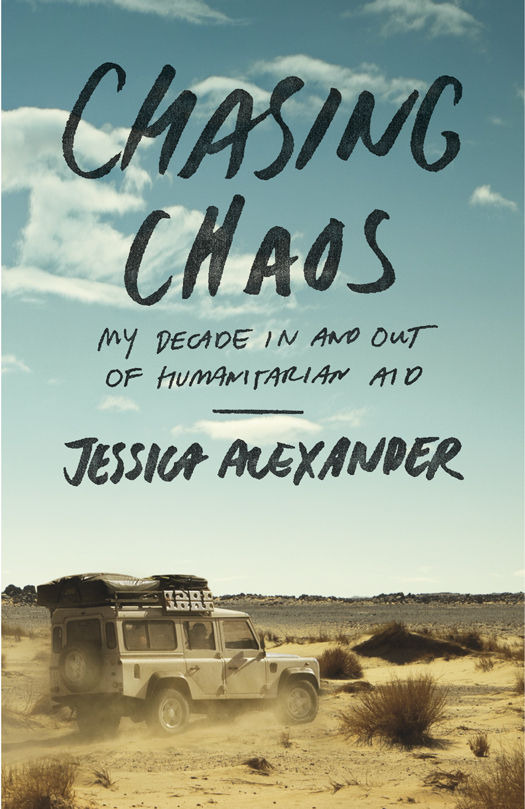
Book 51 of 2023
Title: Chasing Chaos: My Decade in and Out of Humanitarian Aid Authors: Jessica Alexander ISBN: 9780770436919 Tags: AU African Union, AU AUMIS African Union Mission in the Sudan, BDI Burundi, COG Congo-Brazzaville, Disaster - Cyclone Nargis (2008), Disaster - Hatian Earthquake (2010), Disaster - Hurricane Mitch (1998), Disaster - Indian Ocean Earthquake and Tsunami (2004), GBR BA British Army, GBR United Kingdom, HND Honduras, HND Teguchigalpa, HTI Delmas 31 Camp, HTI Gaston Margon Camp, HTI Haiti, HTI Jacmel, HTI MINUSTAH United Nations Stabilisation Mission in Haiti, HTI Port-au-Prince, Humanitarian Aid, ICC International Criminal Court - Hague, IDN Banda Aceh, IDN Indonesia, KEN Kenya, KEN Nairobi, LBR Liberia, LBR National Patriotic Front of Liberia, LBR President Charles Taylor, LKA Sri Lanka, LKA Tamil Tigers, MOZ Mozambique, RWA Hutu Tribe, RWA ICTR International Criminal Trial for Rwanda (Rwandan Civil War), RWA KGL Kigali International Airport, RWA Kibuye, RWA Kigali, RWA Kinbungo, RWA Kiziba, RWA President Juvenal Habyarimana, RWA Rwanda, RWA Rwandan Civil War (1990-1994), RWA Rwandan Genocide (1994) (Rwandan Civil War), RWA Tutsi Tribe, SDN Abu Shouk Refugee Camp, SDN Al Salam Refugee camp, SDN Dar Zagawa, SDN Darfur, SDN Darfur - Abu Shouk Refugee Camp, SDN Darfur - Al Salam Refugee Camp, SDN Darfur - Zam Zam Refugee Camp, SDN Hamadyia Refugee Camp, SDN Hassa Hissa Refugee Camp, SDN Janjaweed Militia, SDN Jebel Marra, SDN Jebel Si, SDN JEM Justice and Equality Movement Army, SDN Juba, SDN Kalma Refugee Camp, SDN Khartoum, SDN Korma, SDN Mukjar, SDN North Darfur, SDN North Darfur - El Fasher, SDN Nuba Mountains, SDN Nyala, SDN President Omar Al-Bashir, SDN Second Sudanese Civil War (1983-2005), SDN SLA Sudanese Liberation Army, SDN South Darfur, SDN Sudan, SDN Tawila, SDN Zalingei, SDN Zam Zam Refugee Camp, SLE Bo, SLE Child Soldiers (Sierra Leone Civil War), SLE Freetown, SLE IMATT International Military Advisory and Training Team, SLE Kailahun, SLE Makeni, SLE RUF Revolutionary United Front, SLE SCSL Special Court (Sierra Leone Civil War), SLE Sierra Leone, SLE Sierra Leone Civil War (1991-2002), TCD Chad, TMP East Timor, TMP Free Aceh Movement, TZA Tanzania, UN UNDP United Nations Development Programme, UN UNICEF United Nations Childrens Fund, UN United Nations, US NY JFK International Airport, US NY New York, USAID Rating: ★★★★ (4 stars) Subject: Disasters
Description: An eye-opening and intimate memoir about life as an international humanitarian aid worker in the field in Rwanda, Sudan, Sierra Leone, and Haiti. Jessica Alexander arrived in Rwanda in the aftermath of the genocide as an idealist intern, excited to be a part of the international humanitarian aid community. But the world that she encountered in the field was dramatically different than anything she could have imagined. In this honest and irreverent memoir, she introduces readers to the reality of the life of an aid worker. We watch as she helps to resettle refugees in Rwanda, manages a 24,000-person camp in Darfur, and helps a former child soldier in Sierra Leone get rid of a tattoo that was carved into his skin by a rebel group. But we also see the alcoholic parties and fleeting romances, the burnouts and cyncism, the plans and priorities that constantly shift and change. Tracing her personal journey from idealistic and naïve newcomer to hardened cynic to hopeful but critical realist, Alexander transports readers to some of the most troubled locations and shows us not only the impossible challenges, but also the moments of hope and recovery. Review: It was a pretty decent book that gave the reader some insight into the situations in Darfur, Haiti, and Sierra Leone from the perspective of a humanitarian aid worker. You'll understand why the help offered is rarely helpful at all, and good intentions is really a double edged sword. There's some good, a lot of bad, a lot of stress, confusion, and a system rigged to fail for the most part. But there's also the human element, and the people that are affected at every level make this a story worth reading.
2 notes
·
View notes